Unit 5 Wild animals Task课件(共37张PPT)
文档属性
| 名称 | Unit 5 Wild animals Task课件(共37张PPT) |
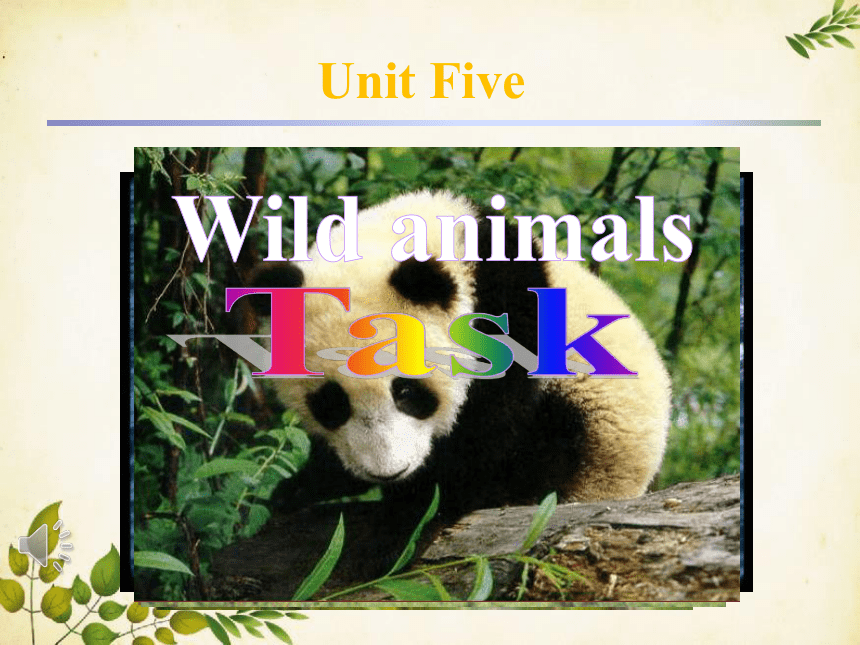
|
|
| 格式 | pptx | ||
| 文件大小 | 17.1MB | ||
| 资源类型 | 教案 | ||
| 版本资源 | 牛津译林版 | ||
| 科目 | 英语 | ||
| 更新时间 | 2023-07-19 14:40:13 | ||
图片预览

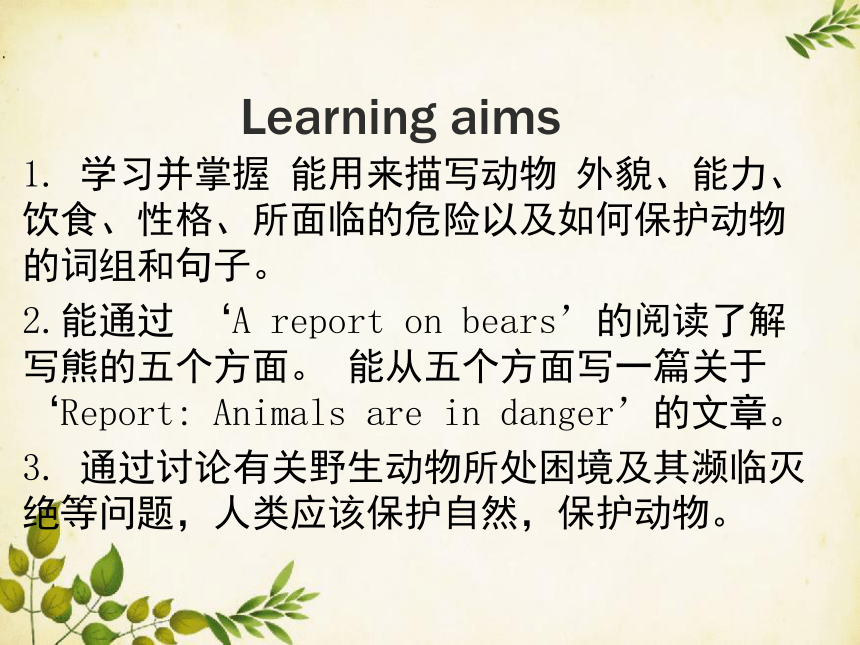
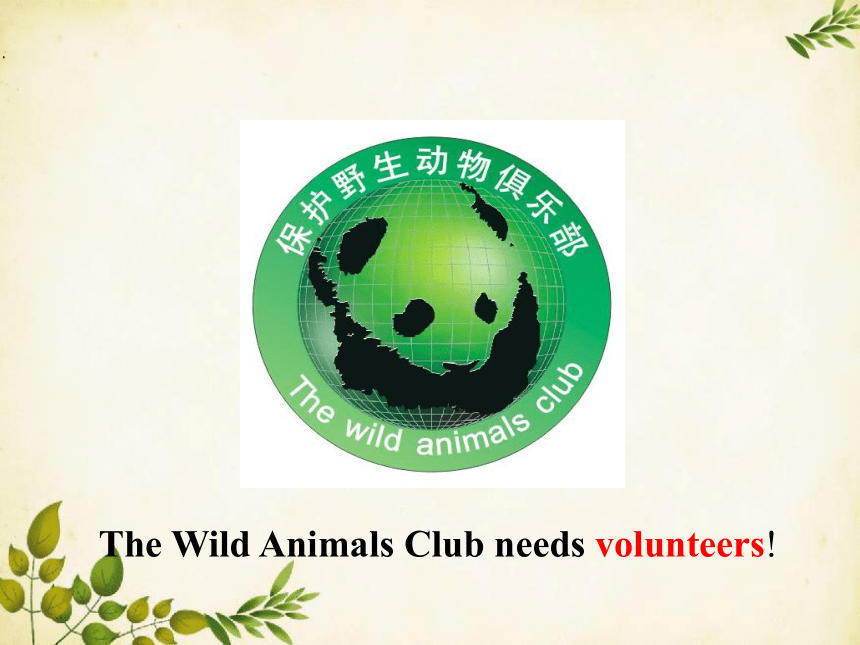

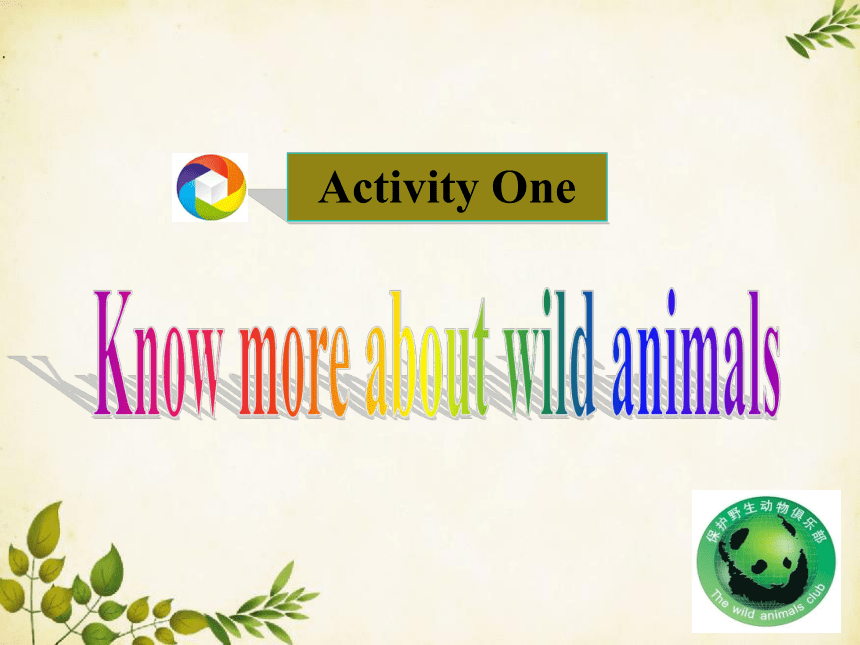
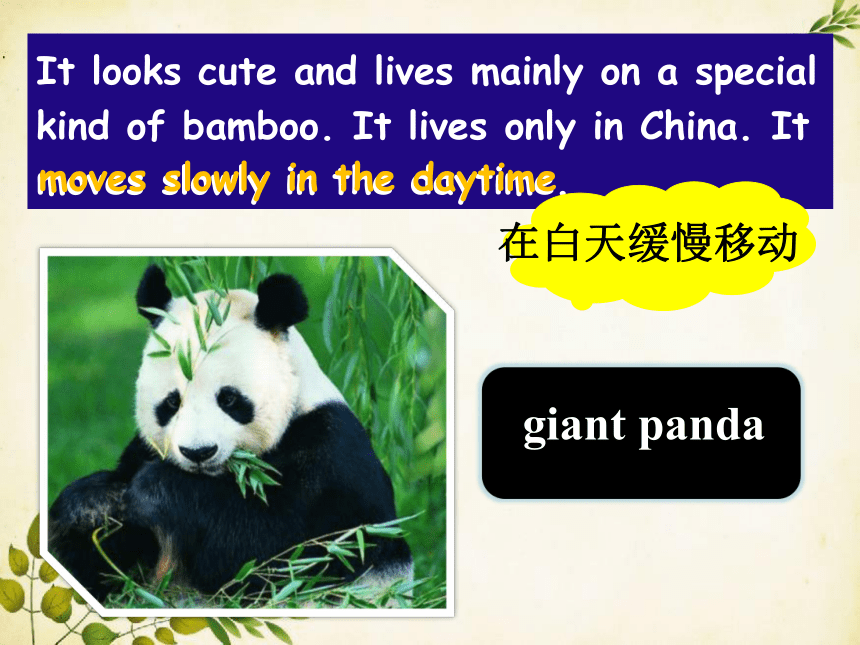
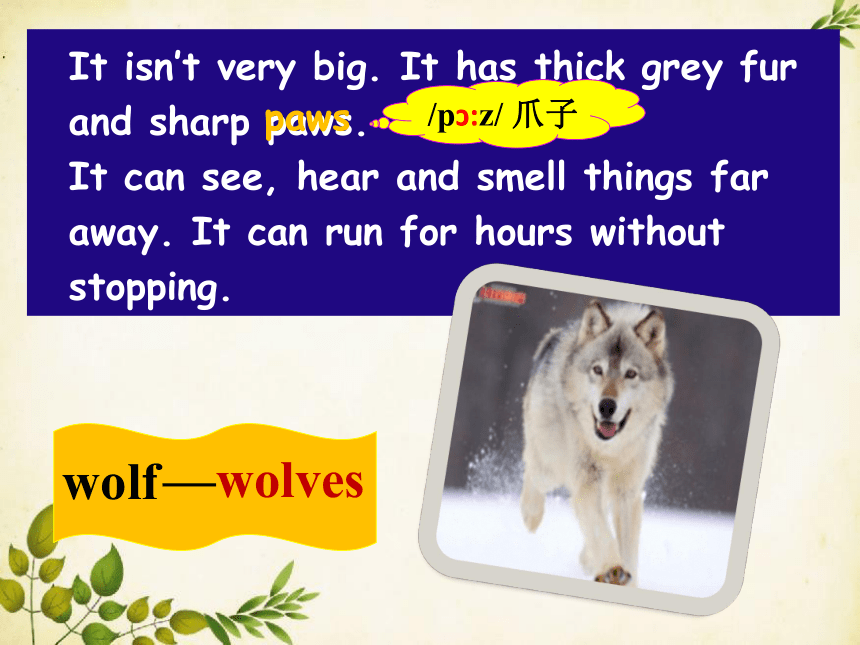
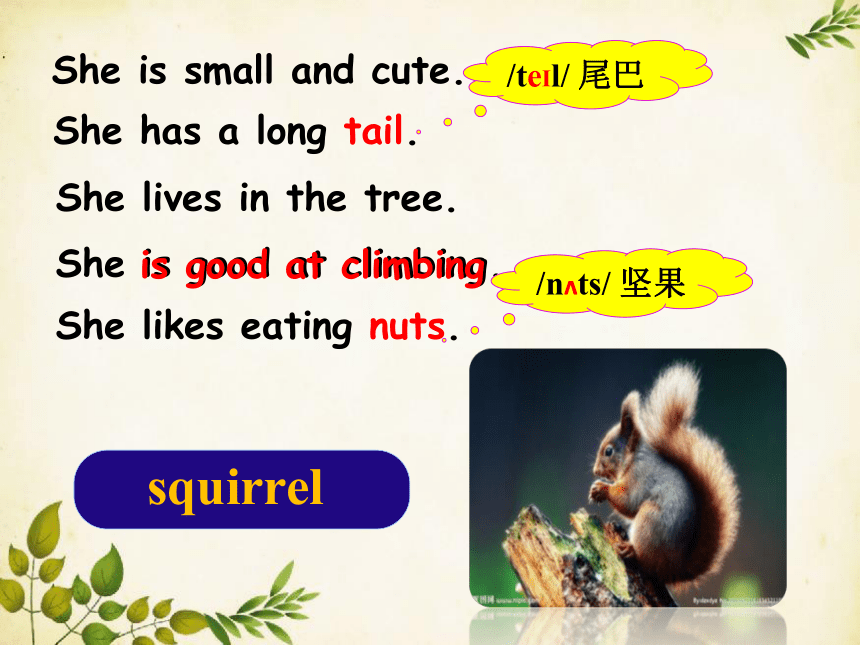
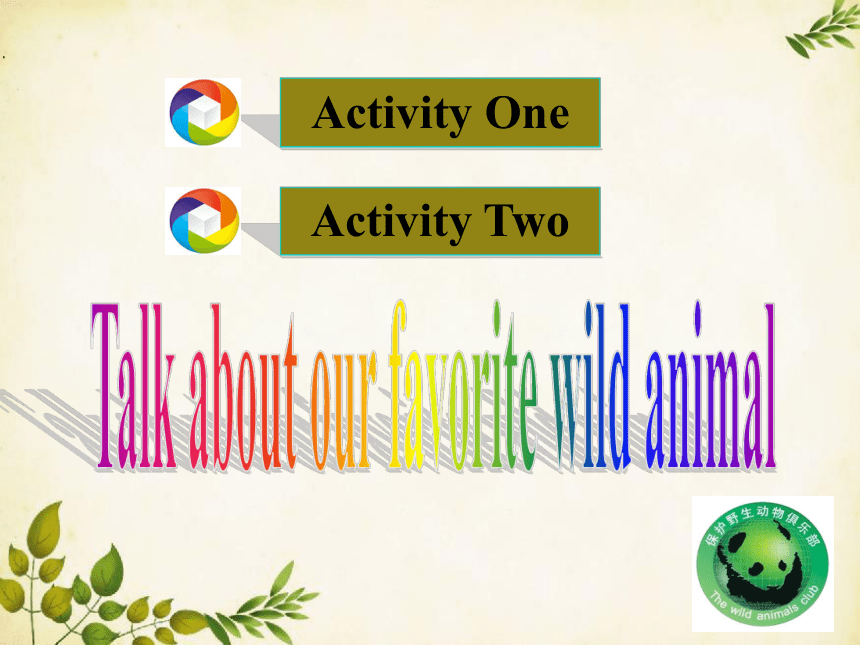
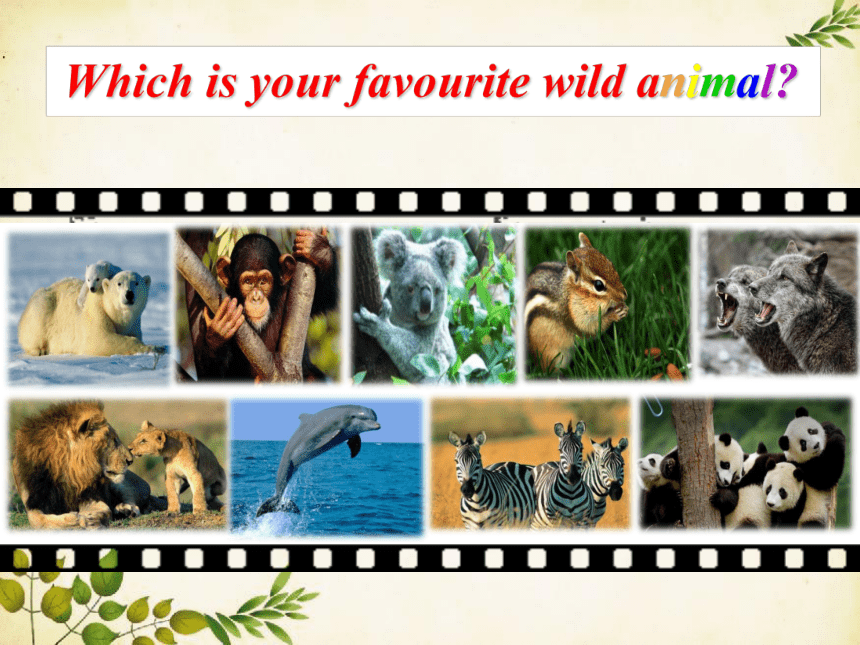
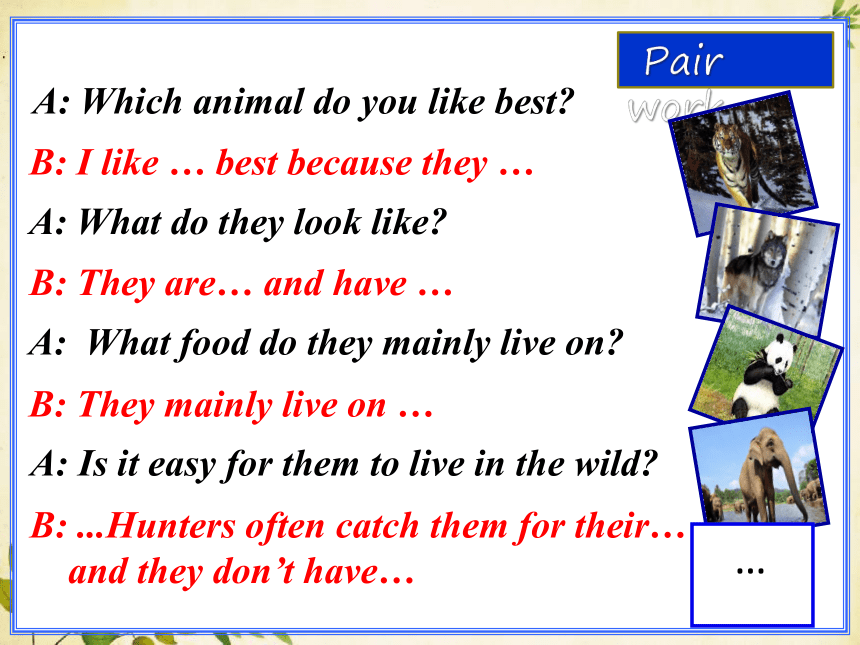
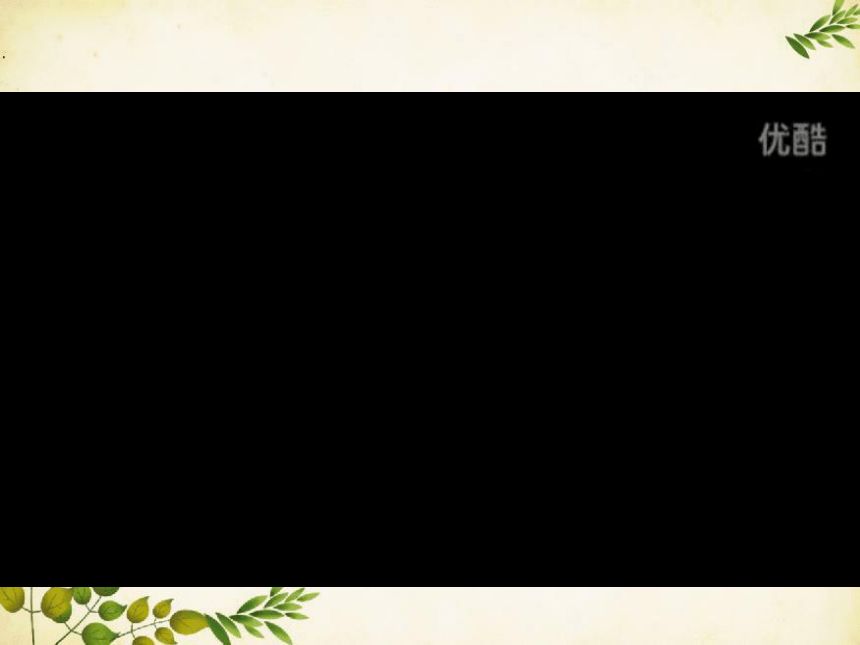
文档简介
(共37张PPT)
Unit Five
Wild animals
Task
Learning aims
1. 学习并掌握 能用来描写动物 外貌、能力、饮食、性格、所面临的危险以及如何保护动物的词组和句子。
2.能通过 ‘A report on bears’的阅读了解写熊的五个方面。 能从五个方面写一篇关于 ‘Report: Animals are in danger’的文章。
3. 通过讨论有关野生动物所处困境及其濒临灭绝等问题,人类应该保护自然,保护动物。
The Wild Animals Club needs volunteers!
Activity One
Activity Two
Activity Three
Be a member of the Wild Animals Club
Activity Four
Activity One
Know more about wild animals
It looks cute and lives mainly on a special kind of bamboo. It lives only in China. It moves slowly in the daytime.
giant panda
在白天缓慢移动
moves slowly in the daytime
It isn’t very big. It has thick grey fur
and sharp paws.
It can see, hear and smell things far
away. It can run for hours without
stopping.
wolf
paws
/p :z/ 爪子
—wolves
She is small and cute.
She lives in the tree.
She is good at climbing.
She likes eating nuts.
She has a long tail.
/teIl/ 尾巴
/n ts/ 坚果
squirrel
is good at climbing
Activity Two
Talk about our favorite wild animal
Activity One
Which is your favourite wild animal
A: Which animal do you like best
B: I like … best because they …
A: What do they look like
B: They are… and have …
A: What food do they mainly live on
B: They mainly live on …
A: Is it easy for them to live in the wild
B: ...Hunters often catch them for their…
and they don’t have…
Pair work
…
How much do you know about bears
Looks:
● big and heavy, large body, short and strong legs, large paws,
short tail
Food:
● most eat meat and fish, some also eat plants and insects
Abilities:
● can run very fast, good at climbing and swimming
Qualities:
● move around slowly in the daytime, sleep through the winter,
seldom hurt people
Danger:
● hunters catch them for their fur and paws
Read and complete
/’Insekts/
heavy
strong
short
fish
insects
run very fast
climbing
swimming
the winter
seldom
fur
paws
Looks
Food
Abilities
Qualities
Or
Danger
Title
Let’s compare!
A. Bears can run very fast. They can climb
and swim well.
B. Bears can run very fast. They are good at
climbing and swimming.
Try to use different expressions (表达).
are good at
Try to be different!
We should take action to stop this. Otherwise,
there may be no bears left in the world.
We should take action to stop this, or there
may be none left in the world.
or
none
If we do not take action to stop this, there
may be none left in the world.
If
Let’s compare!
A. Most bears eat meat and fish. Some also
eat plants and insects.
B. Most bears eat meat and fish, but some
also eat plants and insects.
Conjunctions连词 can make
sentences more logical (符合逻辑的).
the sentences more vivid(生动的).
but
1. Some people think animals are
dangerous to humans, ________ I
don’t think so.
2. Animals are our friends, ________
we shouldn’t kill them for any reason.
3. We should act to protect animals ________ they
are in danger.
4. ________ we don’t take action right now, there
will be no animals in the world.
I’m good at using conjunctions!
and
but
if
so
because
but
because
so
If
Activity Three
Activity Two
Report an animal in danger
Step 1:Choose one of the animals to report.
A
B
C
D
E
F
Group work
Notes on tigers
Looks:
Food:
Abilities:
Qualities:
Danger:
big and strong, bright eyes, orange fur with dark stripes
animals
can run fast, but only for a short while, able to swim and climb
like to live alone
hunters catch tigers for their fur, bones or other parts of the body
Notes on wolves
Looks:
Food:
Abilities:
Qualities:
Danger:
not very big, thick fur
animals, sometimes fruit
can see, hear and smell things far away can run for hours without stopping
often work as a team, never kill for fun
lose living areas,
people kill wolves because they think
wolves are dangerous to humans
Notes on giant pandas
Looks:
Food:
Abilities:
Qualities:
Danger:
black and white, look like bears
bamboo, baby pandas drink their mums’ milk
can climb trees
quiet and peaceful,
like to live alone
difficult to have babies,
baby pandas get sick and die easily,
may not have a place to live or food to eat
Notes on elephants
Looks:
Food:
Abilities:
Qualities:
Danger:
big and heavy, a long trunk(象鼻),
large ears like fans,
the biggest living animals on land
mainly grass and leaves, sometimes meat
walk on tiptoe (用脚尖走路),
can move quietly
like to work as a group
people hunt them for their tusks,
have fewer and fewer living areas
Notes on golden monkeys
Looks:
Food:
Abilities:
Qualities:
Danger:
a lot of golden hair on its back,
a long tail, bright eyes
fruit
climb the trees, make big noise,
run after each other
live in groups
their living areas are
getting worse,
people hunt them
too much
Notes on dolphins
Looks:
Food:
Abilities:
Qualities:
Danger:
big and cute, pointed mouth (尖嘴巴)
fish
able to swim fast, can play tricks,
can work out Maths problems
friendly and clever
water pollution
Step 2: Work in groups to write the article.
Group work
________ are in danger
___________________________________________
___________________________________________
___________________________________________
___________________________________________
___________________________________________
Looks外貌
Food食物
Abilities能力
Qualities特性
Danger险境
Step 3: Exchange the works and modify with a
red pen.
One student reads, the others give ideas.
Group work
Grammar (语法)
Word usage (用词)
Punctuation (标点)
Spelling (拼写)
Handwriting(书写)
Attention!
Step 3:
How to appraise a good writing (内容,结构,语言)
Clear characters (特征明显)
Different paragraphs (分段描写)
Long sentences (擅用长句)
No mistakes (避免错误)
Good handwriting (书写工整)
Show Time
Step 4: Appraise (评价) the report.
Activity Four
Activity Three
Try to help animals in danger
● What/Who makes wild animals in danger
It’s a great pity that we humans do something terrible to these poor wild animals.
Group discussion
● What can we do to help wild animals
Group discussion
Be an animal lover.
Never hunt them for food or
anything else.
Never buy anything made of animal
fur.
Make laws to protect them.
Build more reserves to make them
live better.
Set up more wild animals clubs to help
and ask more people to join us.
Suggestions:
One earth, one family.
Protecting wild animals,
Protecting ourselves!
Homework:
1.背诵课文。
2.完成导学案。
Unit Five
Wild animals
Task
Learning aims
1. 学习并掌握 能用来描写动物 外貌、能力、饮食、性格、所面临的危险以及如何保护动物的词组和句子。
2.能通过 ‘A report on bears’的阅读了解写熊的五个方面。 能从五个方面写一篇关于 ‘Report: Animals are in danger’的文章。
3. 通过讨论有关野生动物所处困境及其濒临灭绝等问题,人类应该保护自然,保护动物。
The Wild Animals Club needs volunteers!
Activity One
Activity Two
Activity Three
Be a member of the Wild Animals Club
Activity Four
Activity One
Know more about wild animals
It looks cute and lives mainly on a special kind of bamboo. It lives only in China. It moves slowly in the daytime.
giant panda
在白天缓慢移动
moves slowly in the daytime
It isn’t very big. It has thick grey fur
and sharp paws.
It can see, hear and smell things far
away. It can run for hours without
stopping.
wolf
paws
/p :z/ 爪子
—wolves
She is small and cute.
She lives in the tree.
She is good at climbing.
She likes eating nuts.
She has a long tail.
/teIl/ 尾巴
/n ts/ 坚果
squirrel
is good at climbing
Activity Two
Talk about our favorite wild animal
Activity One
Which is your favourite wild animal
A: Which animal do you like best
B: I like … best because they …
A: What do they look like
B: They are… and have …
A: What food do they mainly live on
B: They mainly live on …
A: Is it easy for them to live in the wild
B: ...Hunters often catch them for their…
and they don’t have…
Pair work
…
How much do you know about bears
Looks:
● big and heavy, large body, short and strong legs, large paws,
short tail
Food:
● most eat meat and fish, some also eat plants and insects
Abilities:
● can run very fast, good at climbing and swimming
Qualities:
● move around slowly in the daytime, sleep through the winter,
seldom hurt people
Danger:
● hunters catch them for their fur and paws
Read and complete
/’Insekts/
heavy
strong
short
fish
insects
run very fast
climbing
swimming
the winter
seldom
fur
paws
Looks
Food
Abilities
Qualities
Or
Danger
Title
Let’s compare!
A. Bears can run very fast. They can climb
and swim well.
B. Bears can run very fast. They are good at
climbing and swimming.
Try to use different expressions (表达).
are good at
Try to be different!
We should take action to stop this. Otherwise,
there may be no bears left in the world.
We should take action to stop this, or there
may be none left in the world.
or
none
If we do not take action to stop this, there
may be none left in the world.
If
Let’s compare!
A. Most bears eat meat and fish. Some also
eat plants and insects.
B. Most bears eat meat and fish, but some
also eat plants and insects.
Conjunctions连词 can make
sentences more logical (符合逻辑的).
the sentences more vivid(生动的).
but
1. Some people think animals are
dangerous to humans, ________ I
don’t think so.
2. Animals are our friends, ________
we shouldn’t kill them for any reason.
3. We should act to protect animals ________ they
are in danger.
4. ________ we don’t take action right now, there
will be no animals in the world.
I’m good at using conjunctions!
and
but
if
so
because
but
because
so
If
Activity Three
Activity Two
Report an animal in danger
Step 1:Choose one of the animals to report.
A
B
C
D
E
F
Group work
Notes on tigers
Looks:
Food:
Abilities:
Qualities:
Danger:
big and strong, bright eyes, orange fur with dark stripes
animals
can run fast, but only for a short while, able to swim and climb
like to live alone
hunters catch tigers for their fur, bones or other parts of the body
Notes on wolves
Looks:
Food:
Abilities:
Qualities:
Danger:
not very big, thick fur
animals, sometimes fruit
can see, hear and smell things far away can run for hours without stopping
often work as a team, never kill for fun
lose living areas,
people kill wolves because they think
wolves are dangerous to humans
Notes on giant pandas
Looks:
Food:
Abilities:
Qualities:
Danger:
black and white, look like bears
bamboo, baby pandas drink their mums’ milk
can climb trees
quiet and peaceful,
like to live alone
difficult to have babies,
baby pandas get sick and die easily,
may not have a place to live or food to eat
Notes on elephants
Looks:
Food:
Abilities:
Qualities:
Danger:
big and heavy, a long trunk(象鼻),
large ears like fans,
the biggest living animals on land
mainly grass and leaves, sometimes meat
walk on tiptoe (用脚尖走路),
can move quietly
like to work as a group
people hunt them for their tusks,
have fewer and fewer living areas
Notes on golden monkeys
Looks:
Food:
Abilities:
Qualities:
Danger:
a lot of golden hair on its back,
a long tail, bright eyes
fruit
climb the trees, make big noise,
run after each other
live in groups
their living areas are
getting worse,
people hunt them
too much
Notes on dolphins
Looks:
Food:
Abilities:
Qualities:
Danger:
big and cute, pointed mouth (尖嘴巴)
fish
able to swim fast, can play tricks,
can work out Maths problems
friendly and clever
water pollution
Step 2: Work in groups to write the article.
Group work
________ are in danger
___________________________________________
___________________________________________
___________________________________________
___________________________________________
___________________________________________
Looks外貌
Food食物
Abilities能力
Qualities特性
Danger险境
Step 3: Exchange the works and modify with a
red pen.
One student reads, the others give ideas.
Group work
Grammar (语法)
Word usage (用词)
Punctuation (标点)
Spelling (拼写)
Handwriting(书写)
Attention!
Step 3:
How to appraise a good writing (内容,结构,语言)
Clear characters (特征明显)
Different paragraphs (分段描写)
Long sentences (擅用长句)
No mistakes (避免错误)
Good handwriting (书写工整)
Show Time
Step 4: Appraise (评价) the report.
Activity Four
Activity Three
Try to help animals in danger
● What/Who makes wild animals in danger
It’s a great pity that we humans do something terrible to these poor wild animals.
Group discussion
● What can we do to help wild animals
Group discussion
Be an animal lover.
Never hunt them for food or
anything else.
Never buy anything made of animal
fur.
Make laws to protect them.
Build more reserves to make them
live better.
Set up more wild animals clubs to help
and ask more people to join us.
Suggestions:
One earth, one family.
Protecting wild animals,
Protecting ourselves!
Homework:
1.背诵课文。
2.完成导学案。
